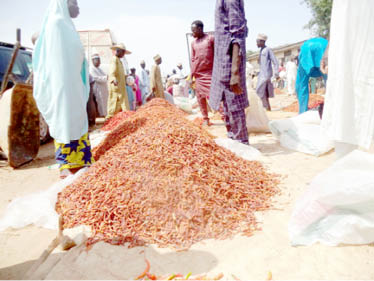From what was known as backyard farming, farmers in Katsina State are now taking pepper production to a higher level.
The high demand for the product in other states and some countries in the West African sub-region is motivating many farmers in the state into large-scale production of the fruit.
Pepper, a specie of Capsicum Annum and widely known as chili pepper, is traced to Mexico; and is cultivated across South Asia and Africa.
It is used in different Asian and African cuisines and as ornamentals for dishes, as well as for industrial uses like in the production of tear gas.
According to the farmers, 20 years ago pepper farming was attributed to the Fulani and other rural communities that grew it on a small scale at their backyard farms, but with the rapid increase in population worldwide, the market demand for the produce encouraged them to plant it in their main farms.
Hamza Dalhatu, a farmer, said most other farmers were carried away by the yield and revenue coming from maize, rice and soybeans and, therefore, failed to realise the prospects of pepper production.
“Instead of hoarding the produce that most people here consume, producing it on the farm is far more profitable. However, the crop requires ample application of NPK fertiliser depending on the fertility of the farm, and it takes three months from the day of transplant to harvest.
“A hectare can give 45 to 50 bags as the crop is harvested piecemeal, like 4 to 5 times.”
Dalhatu said, however, that this year, the incessant rainfall has affected the production of the crop as it does not require too much water on the farm.
“Ideally, a pepper farm needs to be in a highland area, and we mostly produce it mixed with onions, and thereafter we plant beans on the same farm the same year. At its best, a single pepper plant can yield up to 200 fruits and it can keep bearing fruit all year round provided there is moisture on the farm.
“Last year, I produced pepper worth a million naira as I sold each bag (20kg) at N40,000,” Dalhatu said.
At the pepper section of Bakori market, a dealer of the produce, Alhaji Saminu Kabomo, said the market for pepper in Katsina was fast expanding beyond the shores of the state.
“I have been in the pepper business for over 40 years and I am witnessing its evolving market. Merchants come from Senegal, Mali and Ghana to buy the produce from this market for onward distribution to other countries. Very soon, international merchants will start coming as the harvest of new pepper has begun,” Alhaji Saminu said.
He added that when the produce was scarce in the market, they sourced it from Sundu, Hadeja, Gashua, Makarfi and Gumi to sustain the market pending the harvest of the crop.
This reporter gathered that the produce was sold in kilogrammes and that 20kg makes a bag, which is sold at N28,000 to N30,000 depending on quality and type.
Trucks and vans from different parts of the country and beyond were seen loading the produce at the Bakori market, which is held twice a week.

 Join Daily Trust WhatsApp Community For Quick Access To News and Happenings Around You.
Join Daily Trust WhatsApp Community For Quick Access To News and Happenings Around You.


